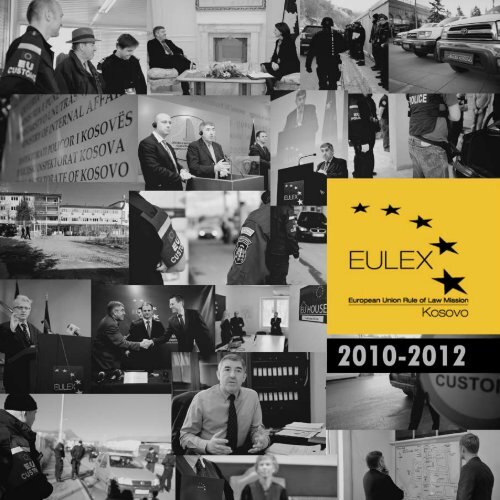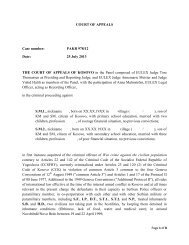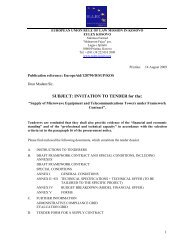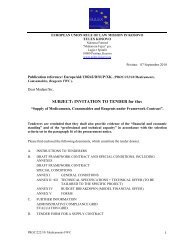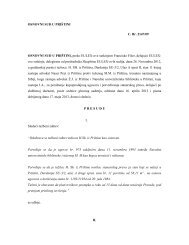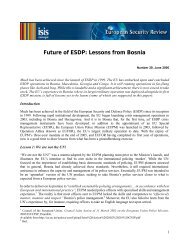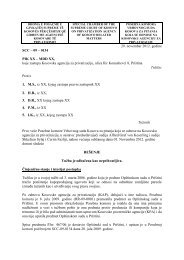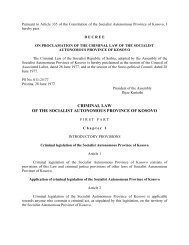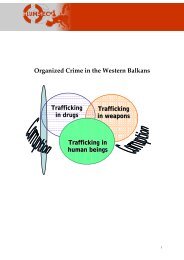You also want an ePaper? Increase the reach of your titles
YUMPU automatically turns print PDFs into web optimized ePapers that Google loves.
ForewordI would like to welcome you to this compilation ofphotographs and text covering the work of the EuropeanUnion Rule of Law Mission, EULEX Kosovo,between 2010 and <strong>2012</strong>. It was a fascinating andchallenging period to be Head of the largest civilianmission ever deployed by the EU, at its largest,amounting to some three thousand staff members.The book encapsulates the ups and downs, the successesand failures, the real advances and some ofthe obstacles faced by the mission in one of themost complex political environments in Europe.I would like to thank my EULEX staff who gave metheir support and professionalism for the duration ofmy office. I would also like to thank my colleagues inBrussels and EU Member States, the US Embassy inPristina, and my counterparts in Kosovo and neighbouringcountries. Most of all, I would like to thankthe people of Kosovo for their support, patience anddetermination to take their society forward and toembrace their European future. The young peopleof Kosovo especially deserve this.Emerging from conflict, and building a society basedon the rule of law, is no easy process. But that processis very much underway and Kosovo is heading inthe right direction. I wish Kosovo and it’s people allthe best on their road ahead.Xavier de Marnhac
October 2010The Head of the EULEX Mission, XavierDe Marnhac, entered office and beganwork.4
Reporting to Member States on his initial meetings with EULEX staff, De Marnhac said “I clearly speltout my intention to be a team builder and to work towards a greater synchronisation of thought andaction between all units. There is a need, in my view, to streamline information flow and to improvecross component collaboration, not only to utilise more fully the collective intelligence of EULEX,but also to be able to speak with one voice when addressing our external partners. I also emphasisedthat for the confidence I have entrusted in all Mission members, loyalty was a basic principleI expected in return.”Immediate situation in Kosovo faced by the new Head of Mission: no Minister of Justice, electionsimminent, no major cases at trial stage, minimal presence north of the river Ibar/Ibër.In his initial Statement of Intent, the Head of Mission outlined the mission’s priorities:To increase the mission’s ‘footprint’ in the north by normalising EULEX’s activities through increasingvisibility and presence on a 24/7 basis to reinforce the promotion of the rule of law.To maintain and strengthen the momentum in the fight against organised crime and corruption.To increase monitoring mentoring and advising activities in the fields of police, justice and customswith a focus on preparing for transition.On 15 October 2010, there were 1606 international staff and 1168 local staff deployed.
One measure of the mission’s ‘footprint’ in the north was the number of EULEX staff living north of theriver Ibar/Ibër. When the new Head of Mission arrived, there was only a handful of people living in thenorth.
The security at the enthronement of the new Serbian Orthodox Patriarchin Peć/Pejë on 3 October was ensured by the Kosovo Police (KP).EULEX supported the KP in preparations and were on standby duringthe event itself.
December 2010Extraordinary Kosovo Parliamentaryelections took place on 12 December 2010.A report by Council of Europe Rapporteur, Dick Marty, on trafficking in human organs during the Kosovoconflict of 1998-1999 made political waves in Kosovo on 16 December.
February 2011At the inaugural session of the Kosovo Assembly on 21-22 February,the leader of the Alliance for a New Kosovo, Beghjet Pacolli,was elected President by Assembly members of the governmentcoalition, while most opposition deputies walked out. Questionsover the legality of the vote led to it being overturned and declaredunconstitutional in April 2011, triggering a new politicalcrisis. This was resolved later in the month by the appointmentof consensus candidate, Atifete Jahjaga, a former Kosovo PoliceDeputy Director General.
On 8 March a technical dialogue between Belgrade and Pristina began in Brussels. The Dialogue addressedsuch issues as licence plates, crossing point management and the Kosovo Civil Registry.
On 16 March, under the orders of a EULEX pre-trial judge, nine people, including a KP Regional Commanderand a Kosovo Albanian extradited from Switzerland, were arrested on suspicion of committingwar crimes against the civilian population and against prisoners of war during the conflict in 1999. A tenthsuspect, Fatmir Limaj, a former Kosovo Liberation Army (KLA) commander, former Minister of Transportand Telecommunications, MP and PDK Deputy Chair, was not placed under arrest because of the possibleimmunity to arrest he may have had as an MP. The arrest operations triggered protests from KLA veterans,Pristina University students and other organisations. As a member of the Assembly, Limaj did notenjoy immunity from prosecution for the alleged crimes committed, but the issue of his immunity fromarrest continued to remain unclear.On 18 April 2011, the Joint Rule of Law Coordination Board(JRCB) met for the first time since the establishment of thenew government in March. The JRCB is a forum for EU actorsand the Kosovo government to set joint priorities and discussissues in the Kosovo rule of law sector. The meeting wasparticularly significant as representatives of the Commissionwere present for the first time. EULEX had led the initiativeto include them in the JRCB’s terms of reference to reflectthe importance of organising priorities and deliverables accordingto the annual EC Progress Report for Kosovo.
Borko Stefanović, chief negotiator of Belgrade’s delegation for the Dialogue between Pristina andBelgrade, arrived in Pristina on 12 May under heavy security. Supporters of the self-determinationmovement Vetëvendosja, reacted to the visit by blocking the government building, and throwingstones at buildings and at Stefanovic’s escort.In April, a panel of local and EULEX judges found the Mayor of Kaçanik/Kačanik Municipality guiltyof the offence of extortion and unlawful possession of weapons. He was sentenced to three years ofimprisonment and given a 1,500 Euro fine for the charge of unlawful possession of weapons.Photo: Berat Murina
June 2011On 1 June, the Police Inspectorate of Kosovo (PIK) began itsnew task of investigating criminal offences and human rightsviolations committed by Kosovo Police employees, regardless ofrank and position while on duty or off duty. EULEX monitoredand advised in the set-up of the PIK and continues to advise thePIK.On 24 May, eight individuals convicted for corruption
On 17 June, a mixed panel of Kosovo and EULEX judges of the District Court in Pristina issued the verdictin the so-called Tisza River case against defendants charged with organised crime and smugglingof migrants. The Tisza River trial began in February 2011. Eight defendants were accused of causingthe deaths of 15 Kosovo Albanians as part of a botched attempt to cross the border between Serbia andHungary in October 2009.On 22 June, EULEX forensic experts from the Department of Forensic Medicine (DFM) exhumed the remainsof five people from an unmarked site in the cemetery in Gjakovë/Đakovica. The individuals were suspectedof being victims from the Kosovo conflict.
On 2 <strong>July</strong>, the first three agreements in the Belgrade-Pristina Dialogue were reached on thefreedom of movement (and vehicles licence plates), civil registry and university diplomas.<strong>July</strong> 2011In <strong>July</strong>, the Head of Mission, in a joint press conference with PM Thaci said that the mission “respects theconstitution and laws of Kosovo”.EULEX’s footprint in the north was getting bigger. There was also a slow and steady build-up in EULEX’s favourabilityamongst the northern Kosovo Serb community from 9% when the Head of Mission arrived to 31%in <strong>July</strong> 2011, according to polls. This steady increase was about to come to an end.However, despite this positive step forward, a critical agreement was not settled on the issue of Belgraderecognising Kosovo’s custom’s stamp. Consequently, on 20 <strong>July</strong>, the government of Kosovo decided to imposecustoms reciprocity measures on Serbia (and Bosnia-Herzegovina). The measures banned the importof goods with Serbian customs stamps while levying a 10% tax on goods imported from Bosnia.
On 25th of <strong>July</strong>, the Kosovo government attempted to send Regional Operational Support Units (specialpolice units) to the northern crossing points (Gate 1 and 31) to enforce the customs reciprocitymeasures. As a special unit returned through the north of Kosovo it became embroiled in a fire fightand one of the police officers, Enver Zymberi, was shot dead.On 27 <strong>July</strong>, a mob of Kosovo Serbs overran and burned down Gate 1, further inflaming the situation andprompting KFOR to take military control of the gates. KFOR continued to control the gates, partiallyopening them to civilian traffic, and negotiated an agreement on the clearance of roadblocks in the northand the freedom of movement of private vehicles and humanitarian goods through the border/boundarycrossings. EULEX kept a strong police presence at the gates and conducted increased patrols in the north,whilst at the same time pushing forward criminal investigations related to the violent incidents.Photo: Sava Radovanović
Photo: Maša Stojsavljević
On 29 <strong>July</strong>, a panel of EULEX and local judges from Mitrovica District Court issued a verdict finding the defendantsguilty of war crimes and handing prison sentences to Sabit Geci (15 years), Riza Alija (12 years),Haki Hajdari (6 years) and Shaban Hoti (7 years).On 29 August 2011, John Clint Williamson from the United States was appointed Lead Prosecutor for theEULEX Special Investigative Task Force (SITF). SITF would further the investigation into the allegationscontained in the Council of Europe Report of December 2010 by Senator Dick Marty.
On 2 September a new round of the Dialogue started and agreements were reached on the custom’s stampand cadastral issues. Despite Dialogue agreements on mutual recognition of customs stamps and the resumptionof trade on 2 September, EULEX was confronted with renewed opposition from local leaders inthe north, rejecting the presence of KP and Kosovo Customs (KC) at the Gates.Photo: Saša DjordjevićIn mid-September, KFOR officially returned control of the Gatesto EULEX, but barricades erected by local communities on allmajor roads and points of entry to the north prevented EULEXand KFOR from reaching the Gates by land, and forced EULEXto transport personnel and supplies to the Gates via helicopter.KFOR undertook several efforts to remove barricades and restorefree, permanent and unconditional access. Most attempts led tostrong and, at times, very violent reactions by the local populationand further reinforcement of the roadblocks.
On 19 September, the Head of Mission visited Gates 1 and 31.
The so-called Medicus trial involving allegations of human organ trafficking began on 4 October, with severalprotected witnesses beginning their testimony before a panel of local and EULEX judges at the PristinaDistrict Court (DC). The case was prosecuted by a EULEX Prosecutor.On 27 September, violence broke out close to Gate 1 involving local Serbs and KFOR. Eleven peoplewere injured.The Head of Mission, visited Tirana on 4-5 October 2011. The visit was at the invitation of the DeputyPrime Minister and Minister for Foreign Affairs of Albania. He signed a Technical Arrangement on policecooperation with the Albanian Interior Minister.
EULEX undertook a major Kosovo-wide search and arrest operation at the beginning of October. The caseconcerned an investigation into alleged corruption and procurement fraud within the KP. During the operationemployees of the KP Administration and Ministry of Internal Affairs were arrested.On 17 October 2011 Clint Williamson assumed his position as Lead Prosecutor of the Special InvestigativeTask Force (SITF)Archive PhotoOn 19 October the heads of Serbian municipalities in the north jointly refused to further implement anyagreements that Belgrade reached in the Dialogue with Pristina. Moreover, they refused to cooperatewith EULEX and insisted on UNMIK’s re-deployment. The barricades remained.
On 27 October barricades were partially removed. Kosovo Serbs allowed KFOR but not EULEX to passthrough the barricadesPhoto: Igor PavičevićIn November, a mixed panel of one local and two EULEX judges at Pristina District Court found a formerPresident of the Assembly of Kosovo and his advisors guilty of Misappropriation in Office, Assisting in theAbuse of an Official Position and Inciting of Falsification of Official Documents. They all received prisonsentences, though the sentences would not be executed if they did not commit another criminal offencefor a two-year period.
On 23 November, a mixed panel of EULEX judges and a Kosovo judge rendered a verdict in the so-called Bllacacase against Fahredin Gashi et al, finding the defendant guilty of war crimes and sentencing him to 18years in prison. Hysri Rama, the other defendant in the case, received a suspended sentence of 6 monthsin prison for assisting the perpetrator in a politically-motivated murder in 1999. The trial was the firstbased on statements by the cooperative witness Nazim Bllaca, who made a video confession in November2009, giving details on more than 20 alleged politically motivated killings taking place from 1999-2003,many allegedly taking place under orders from the Kosovo Information Service (SHIK) which served theKLA until the end of the Kosovo conflict but was officially disbanded in 2008. The case was led by a EULEXprosecutor from Kosovo’s Special Prosecution Office.Photo: Sava RadovanovićOn 29 November President Boris Tadic called on Kosovo Serbs to remove barricades
On 2 December the Agreed Conclusions on Integrated Border Management (IBM) were reached inthe Dialogue. A significant milestone in the implementation of the agreement on civil registry books was made on 6December, when EULEX certified the first copy of the civil registry books (from originals stored in Serbiaproper). The certified copy was handed over to the Deputy Prime Minister of Kosovo, Edita Tahiri on 20December by the Deputy Head of Mission, Andy Sparkes.In January, EC Commissioner Malmström launched a visa liberalization dialogue with Kosovo.
January <strong>2012</strong>Following joint investigative work by EULEX and Kosovo Police,EULEX police on 26 January carried out the arrest of an individualwanted in connection with the killing of the Kosovo Policeofficer, Enver Zymberi, on 26 <strong>July</strong> 2011. The arrest took place inÇabra/Čabra village in northern Kosovo. The investigation intothe killing of Enver Zymberi was carried out jointly by EULEX andKosovo Police and prosecutors.Archive Photo
On 18 February, the Department of Forensic Medicine documentary made by EULEX’s Press Office was airedon Kosovo TV.
On 24 February Pristina and Belgrade agreed, in the framework of the EU-facilitated Pristina-Belgradedialogue, on a technical protocol to implement the Integrated Management of Crossing Points Agreementreached on 2 December 2011.In February, EULEX launched a Kosovo-wide TV campaign that explained to the general public how thejustice system worked. One-minute episodes were broadcast at peak hours across Kosovo and repeatedfour times a day. The campaign aimed at raising awareness amongst the general public of their rights andobligations and how the judicial process operated.On 7 March, the EU Civilian Operations Commander,Hansjoerg Haber, visited the Mission.On 23 February, the Head of Mission finished a two day visit to Belgrade where he met the President ofSerbia, Boris Tadic.
In March, EC Commissioner Füleattended the inaugural meetingof the Kosovo National Councilfor European Integration, wherehe announced the official startof the Feasibility Study for aStabilization and AssociationAgreement.In March, EULEX began a massive outreach campaign in schools and Universities throughout KosovoEuropean Union Office in Kosovo
On 26 March, EULEX reopened Gate 1 for commercial traffic after refurbishment.On 2 May, more than one-hundred people attended the finale of the EULEX Kosovo photographic competition.Thirty photographs made it to the exhibition ‘Lens on the Law – the right and the wrong’, held inthe National Library in Pristina from 2 till 9 May. The exhibition was also held on 31 May in Brussels at theEuropean Parliament.The EULEX Head of Mission awarded one-thousand euros and a trip to Brussels to the winner of the competition,Berat Murina, 24, from Kamenica.
In the north, a number of violent incidents took place, the mostserious one being the explosion in the Three Towers area of northMitrovicë/a on 8 April, which killed a Kosovo Albanian male. Thecase was under a joint EULEX-KP investigation, and although themotivation remained unclear, the incident triggered strong reactionsand was followed by a spate of incidents in which KosovoSerbs were targeted, notably two shootings in Zvečan/Zveçanand Zubin Potok on 13 April and 15 April, respectively. KP investigedthe incidents with support from EULEX. EULEX and KFORincreased their presence in mixed community areas, in particularthrough joint KP-EULEX patrols in north Mitrovica, in an attemptto improve the security situation through increased visibility.
On 4 May, EULEX donated vehicles to the Ministry of Internal AffairsOn 17 April, Kosovo Police, EULEX and KFOR signed an agreement for the security handover of theDević Monastery in Skenderaj/Srbica to KP.On 2 May, a mixed panel of one local and two EULEX judges at Pristina District Court acquitted FatmirLimaj, Naser Krasniqi, Nexhmi Krasniqi and Naser Shala of all charges of war crimes in the so-calledKleçka case. Earlier, six other defendants were also cleared of all charges. A EULEX prosecutor fromKosovo’s Special Prosecution Office (SPRK) announced that he was appealing the rulings.On 3 May, a mixed panel of one local and two EULEX judges at Peja/Peć District Court found the defendantsBedri Krasniqi, et al guilty of organised crime and kidnapping. The sentences ranged from10 to 17 years of imprisonment.
On 14 June, European Commissioner for Home Affairs Cecilia Malmström handed over the roadmap for visaliberalisation to the Kosovo authorities.On 29 May, EULEX police arrested six people in a major investigation into organised crime. The case wasbeing investigated by a EULEX prosecutor from Kosovo’s Special Prosecution Office. On 31 May, a EULEXpre-trial judge ordered detention on remand for three of the suspects. The three others were givenhouse arrest.In line with the agreement on civil registry books and following the completion of a small scale pilotproject launched in Lipjan/Lipljan on 10 May, a Belgrade representative handed over 52 certified copiesof the original civil status birth registry books to EULEX and on 1 June the acting Head of Mission, AndySparkes, handed them over to the Civil Registry Agency of Kosovo.On 15 June, the Financial Intelligence Centre (FIC) was handed over to the locally headed Financial IntelligenceUnit (FIU).In line with the new OPLAN, the Mission moved into a new structure on 15 June following a massivereconfiguration of the Mission structure and staffing. The three Mission components were transformedinto a structure consisting of an Executive Division and a Strengthening Division. The Mission downsizedby about 25% to a total of around 2,250 staff members. Most regional offices were closed and mobileteams were deployed in their stead to travel to the regions from Pristina. The reconfiguration and downsizeof the Mission was a clear sign of the progress of the Kosovo authorities and the success of the Mis-In the media, however, the event was overshadowed by the death of the Director of the PrivatisationAgency of Kosovo, who, according to the initial autopsy, stabbed himself to death.
<strong>July</strong> <strong>2012</strong>A TV information campaign produced and sponsored by EULEX in support of the Police Inspectorate of Kosovo(PIK) went on air. It explained that members of the public did not have to accept police misbehaviorbut could complain to the PIK to seek redress.EULEX prosecutors filed a number of high-profile indictments, including against the Deputy PrimeMinister, Bujar Bukoshi, the Deputy Minister of Finance, Astrit Haraqia, the permanent secretaryof the Health Ministry, Ilir Tolaj and nine other officials of the Ministry of Health. In addition, eightformer judges were indicted on corruption charges.On 6 <strong>July</strong>, EULEX released a report entitled EULEX 2.0: Rule of Law beyond the Headlines. Thereport takes stock of the work done by EULEX and Kosovo counterparts since the launch of theMission in 2008.On 5, 6 and 11 <strong>July</strong>, EULEX handed over the remains of nine individuals to representatives of theSerbian Government Commission for Missing Persons.EULEX organised a first meeting between Task Force Mitrovica and Kosovo Serb NGOs in the north.
August <strong>2012</strong> September <strong>2012</strong>Throughout August, Kosovo as dominated by preparations for the end of supervised independence, asplanned for 10 September.On 29 August, a panel of three EULEX judges at Mitrovica District Court sentenced Sylajman Hasani to 13years imprisonment for murder. Hasani was charged with the murder of Besir Sheremeti in August 1997 inMitrovica. He was tried in absentia in 1998 by what was then the District Court of Kosovska Mitrovica. Aftera request for protection of legality by the defence counsel, the Supreme Court ordered a retrial.On 7 September, the Assembly of Kosovo voted to confirm Kosovo’s continued commitment to co-operatingwith EULEX as expressed by the Kosovo President in her 4 September invitation letter to the EuropeanUnion High Representative for Foreign Affairs and Security Policy and European Commission Vice-President(HR/VP) Catherine Ashton. During the same session, the Assembly also approved 22 constitutional amendments- the final requirement for the decision by the “International Steering Group” to “end supervisedindependence” on 10 September. After the invitation letter’s adoption, the mission resumed preparationsfor a Joint Rule of Law Co-ordination Board meeting, which eventually brought the signing of the so-called‘Compact’.
EULEX TV presence continued in three formats: the series ‘Justice in One Minute’, an Anti-corruption campaign,and the promotion of the Police Inspectorate of Kosovo. All of these spots were produced in-house.On 20 September, a mixed panel at Mitrovica District Court (DC) relocated to Pristina sentenced JevroPantelić to nine years imprisonment for money laundering and organised crime.On 28 September <strong>2012</strong>, EULEX Police officers arrested Enver Sekiraqa. Mr Sekiraqa was wanted on a warrantissued in February 2008 in relation to his alleged involvement in the murder of the police officerTriumf Riza. Mr Sekiraqa also had to finish serving a sentence of two years of imprisonment for othercrimes. Mr Seqiraqa voluntarily surrendered to a EULEX Special Prosecutor from Kosovo’s Special ProsecutionOffice and police officers from EULEX’s Organised Crime Investigation Unit. The arrest took place inPristina.On 10 October, the European Commission (EC) published its Enlargement Package <strong>2012</strong>, which includedthe Feasibility Study for a Stabilisation and Association Agreement between the EU and Kosovo.On 11 October, the draft Law on Extended Powers of Confiscation of Assets Acquired by Criminal Offence,an EC FS benchmark, was passed at the first reading in the Assembly after lengthy discussions at the ministeriallevel with the participation of EULEX legal experts over the previous months.
On 15 October, EULEX launched the first in a series of campaigns which aimed to highlight the four operationalobjectives of the Mission. The first of these campaigns focused on raising awareness about EULEX’srole in strengthening local rule of law institutions.On 19 October, a mixed panel of one EULEX and two local judges at Pristina District Court found KolёPuka (a former judge) guilty of issuing unlawful judicial decisions, abusing official position or authority,money laundering and fraud. He was sentenced to 10 years imprisonment and prohibited from holdingpublic office or practising law for 3 years after serving the sentence.On 19 October, a historic meeting between Prime Ministers Hashim Thaçi and Ivica Dačić took place in Brussels.It officially resumed the Pristina-Belgrade Dialogue process.On 24 October, EULEX police arrested one individual at Gate 1 in northern Kosovo after using the BorderManagement System (BMS). The individual was wanted by Pristina Municipal Court on a warrant relatedto an attempted rape case. On 28 October, a second individual was arrested on the basis of informationobtained through the BMS during the reporting period. The suspect had a pending arrest warrant againsthim in connection to a grand theft auto case in 2000.
On 30 October, the HR/VP Catherine Ashton arrived in Kosovo, along side the US Secretary of State, HilaryClinton. On 31 October they held meetings with President Jahjaga, PM Thaçi and other political leaders.After Mrs Ashton and Mrs Clinton’s meeting with Mr Thaçi, Mrs Ashton emphasised Kosovo’s European futureat a common press point. She noted that the road ahead for Kosovo would not be easy.On 16 November <strong>2012</strong>, a EULEX special prosecutor from the Special Prosecution Office of Kosovo (SPRK)filed an indictment against Fatmir Limaj and six other co-suspects for organised crime and corruption relatedoffences in the so-called Ministry of Transport and Post Telecommunication (MTPT) case. The defendantswere accused, among other things, of manipulating tender procedures, giving and receiving bribesand obstructing evidence in relation to three tenders in the MTPT for personal and/or material benefit.Meanwhile in the so-called Klecka case, a mixed panel of EULEX judges and local judges at the SupremeCourt, ordered a retrial against Fatmir Limaj and three other co-defendants on 20 November <strong>2012</strong>. TheSupreme Court panel partially granted the appeal of the EULEX Special Prosecutor and annulled the verdictof the first instance court which had acquitted the co-defendants.
On 10 December, at Rudnica–Jainjë (near Gate 1) and at Gate 3 (Merdarë–Merdare), both crossing pointsbegan functioning in line with the agreement on integrated management and with EULEX present at bothlocations. Operations were successfully started at at Rudnica–Jainjë in the morning hours whereas Gate 3was officially opened around noon. EULEX provided technical and logistical support, including the installationof containers and equipment. The new teams of Serbian and Kosovo Officers/EULEX Officers beganworking jointly. Kosovo Police and Kosovo Customs took an active role in checking vehicles and documents.At Gate 3, seven Serbian Police Officers and six Serbian Customs Officers were matched by seven KosovoPolice Officers and four Kosovo Customs Officers. The EULEX presence consisted of two officers working in amonitoring, mentoring and advising capacity.On 28 December <strong>2012</strong>, Baki Sadiki, a fugitive wanted by Slovakia, for his alleged role in large scale drugstrafficking, was extradited from Kosovo to the Slovakia. At the request of the Slovak authorities and inagreement with the Kosovo authorities, EULEX provided assistance to the extradition process.On 31 December, Končulj – Dheu i Bardhë (near Gate 5) and Gate 31 (Bërnjak –Tabalije) began functioningin line with the agreement on integrated management of Crossing Points and with EULEX present at bothlocations.
On 17 January 2013 the fourth meeting was held in the framework of the EU-facilitated high–level dialoguefor the normalization of relations between Belgrade and Pristina . Provisional understanding on thecollection of customs duties, levies and VAT was reached.Bernd Borchardt was appointed new Head of Mission for EULEX on 4 December <strong>2012</strong> and startedwork on 1 February 2013.
Written by James NichollsEditing and Photography by Enisa Rashlanin KasemiLayout by Faton HasaniProduced by EULEX Press and Public Information OfficePrinted by ASHA Graphics


